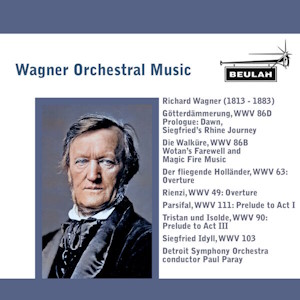
Richard Wagner (1813-1883)
Orchestral Music
Götterdämmerung: Prologue: Dawn, Siegfried’s Rhine Journey
Die Walküre: Wotan’s Farewell and Magic Fire Music
Der fliegender Holländer: Overture
Rienzi: Overture
Parsifal: Prelude to Act One
Tristan und Isolde: Prelude to Act Three
Siegfried Idyll
Detroit Symphony Orchestra/Paul Paray
rec. 1956-1960
Reviewed as a download from a press preview
Beulah 1PDR79 [89]
This disc offers what on the surface looks like a distinct oddity: a French conductor directing an American orchestra in the music of the most German of composers. But as Alex Ross’ scintillating recent book, Wagnerism, amply demonstrates, Wagner was from the start, for all his protestations of Germanness, the most international of composers. Moreover, some of the earliest and most important advocates for his music were French at a point when his fellow countrymen were more than a little diffident. Wagner mania also very quickly crossed the Atlantic and helped shape the developing culture of America with émigré conductors such as the chronically neglected Paul Paray playing a crucial role in that development.
Paray was in charge of the Detroit Symphony Orchestra from 1952 to 1963 and this present recording is evidence not just of his astonishing influence on the growth of that ensemble but just how good even seemingly minor outfits were at this point in the history of America’s orchestral life. Orchestras tended to take on the character of the man on the podium and there is some merit in the idea put forward by Peter Gutmann that at this point the Detroit Symphony of this era were the best French orchestra in the world. In terms of the Wagner on this disc I would say that they combine the very best of the French and American ways with this music for this is a quite brilliant record.
In reviewing Beulah’s reissue of Kubelik conducting the Chicago Symphony in Twentieth Century classics, I noted that the recordings made by Mercury as part of their Living Presence series were always going to be irresistible to that most enterprising of reissue labels. This is the LP era par excellence and the sound on this Beulah version is little short of ravishing.
French conductors of this period had a unique way with string sound and it is in glorious evidence on the final track, the Siegfried Idyll. I tend to find most performances of this piece outstay their welcome, creaking under the weight of too much Wagnerian portentousness. That characteristic French combination of ripeness and light elegance keeps the piece a buoyant delight from first note to last.
Paray’s ability to keep Wagner’s textures airy without seeming insubstantial is much in evidence throughout. In no sense is this semi-skimmed Wagner. Like his great compatriot, Pierre Monteux, Paray knows that passion doesn’t have to equal congested sound. His balancing of the different choirs of strings, brass and woodwind gives a sparkling vibrancy to the sound picture. In the opening Rhine Journey, the waters of Paray’s Rhine are shimmering and pellucid.
This is a somewhat quirky collection of Wagnerian titbits. Instead of the prelude to Act one of Tristan, we get that extraordinary piece of modernism, the prelude to act three complete with a wonderfully Gallic sounding cor anglais. We also get a substantial slice of the end of act three of Die Walküre minus the voices, which had me longing to hear Paray in the full opera so heady was the passion he evokes in his Detroit forces. There is however no room for Siegfried’s Funeral Music nor, a matter of some relief, the Ride of the Valkyries. We get Rienzi but no Tannhauser. Quirky selections then but all the performances justify the repertoire choices.
This is a generously filled disc but I personally would have swapped the Rienzi overture for the pot pourri from Die Meistersinger included on the original release. Obviously I would have preferred both but running time would presumably rule such greed out!
What we do get is more than satisfying. The Detroit Symphony are in brilliant form throughout caught in sound that would give many present day recordings a run for their money. As ever with Beulah, there is a warmth to the sound as well as brilliance, a quality many listeners will associate with the LP era. This sounds like a new record fresh from the record store – remember those? – used to sound like. Universal put out a remastered version of this album, albeit with a slightly different track list in 1996. Generalising, the Universal version has brighter but more brittle sound with a tendency toward the shrill at the top end of the violins where the Beulah sound is mellower and richer.
As for the rest of the programme, the overture to The Flying Dutchman is despatched with great élan and the Parsifal prelude positively glows through the most refined, diaphanous textures imaginable. The influence of this score on later generations of French composers readily apparent.
In terms of American orchestras being put through their paces in Wagner, Szell’s Cleveland recording has long enjoyed deserved fame but this one is just as good and may even be better played and is certainly better recorded.
David McDade
Availability: Qobuz


















